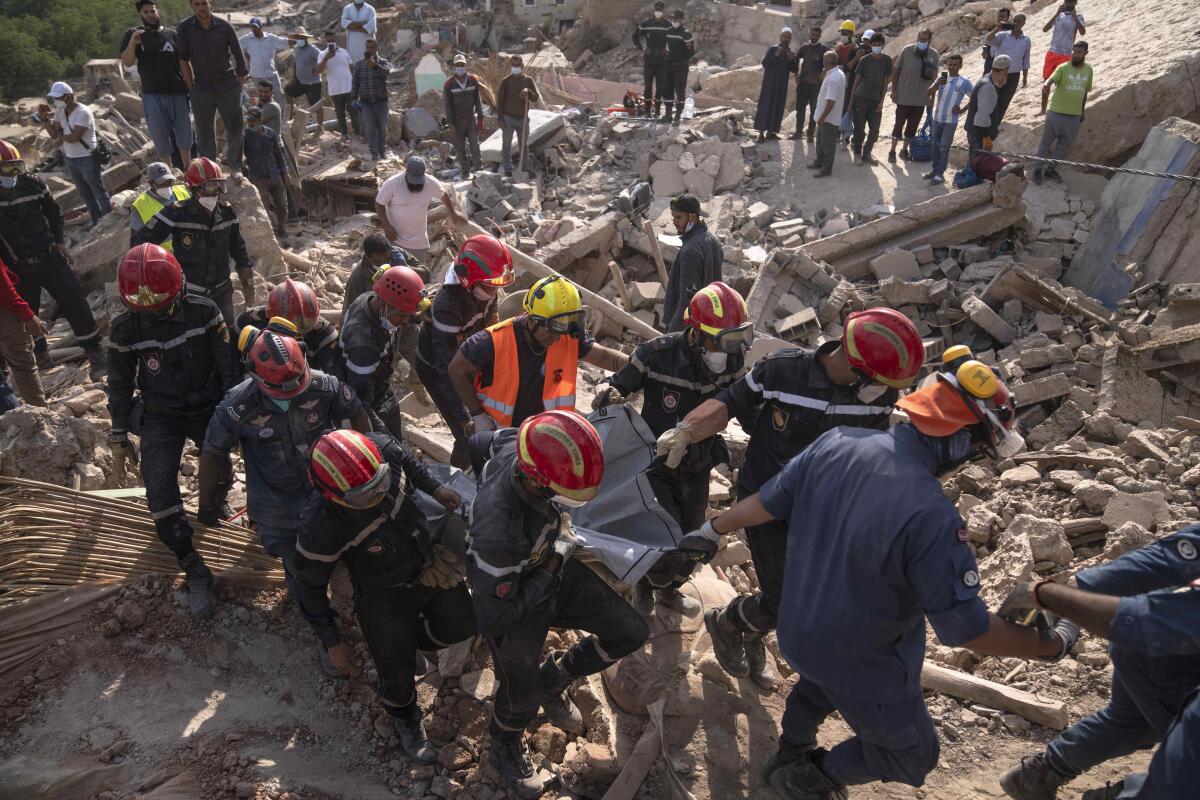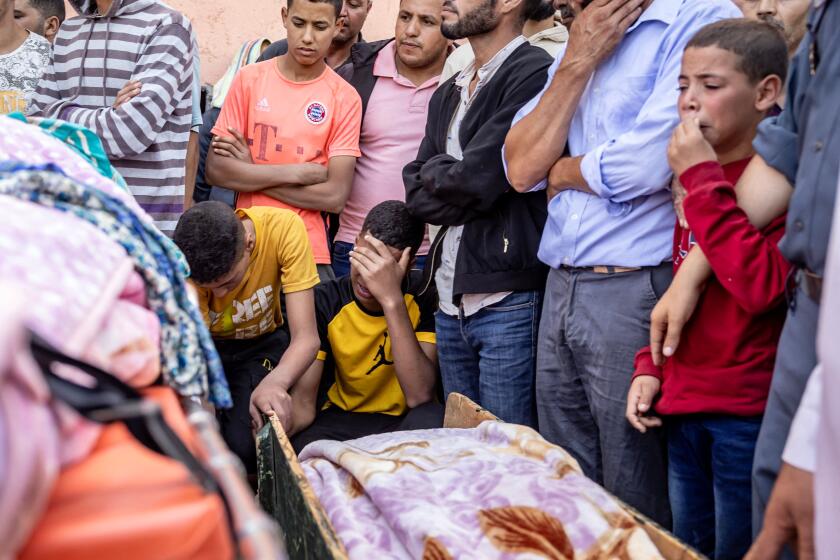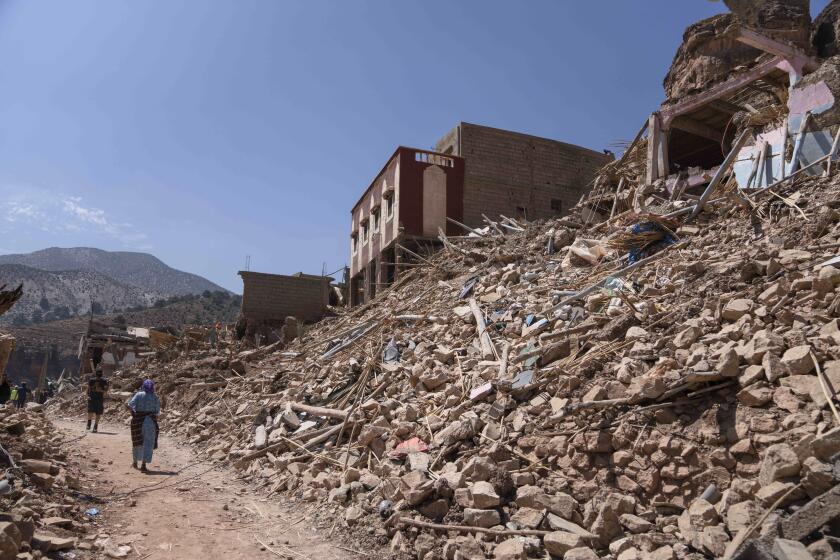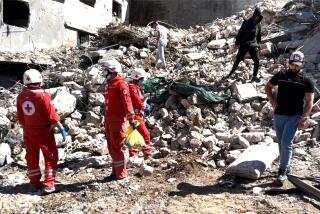Opinion: My family in Morocco felt the earthquake. Here’s how we can all help when disaster strikes

“Earthquake!” my sister wrote me in a text late on Friday. She had been visiting family in our hometown of Rabat, Morocco’s capital, and had just settled down for the night when the temblor started. Like me, my sister lives in California, a place that has long taught us to live with disaster. The shaking had lasted only a couple of seconds. “Woke up everyone,” she said, though she didn’t seem worried. “Now back to sleep.”
I went online, scouring social media sites for news. The videos that emerged over the next hour were all from Marrakech, where the quake had shaken the iconic minaret of the Koutoubia Mosque, reduced some of the ocher walls of the medina to rubble and sent late-night patrons at a trendy café scrambling into the street. But the epicenter of the magnitude 6.8 earthquake turned out to be about 50 miles away in Oukaimedene, a ski resort in the High Atlas Mountains.
A powerful earthquake struck Morocco late Friday, killing hundreds of people and damaging buildings in the historic city of Marrakech and elsewhere.
The High Atlas is an area of unparalleled beauty, with high peaks and narrow passes that attract hikers and backcountry campers, as well as sites of significant cultural heritage, such as the 12th century Tinmel Mosque. The High Atlas is also home to hundreds of small villages, where people are known for their hospitality. What little they have, they will insist on sharing with visitors. Decades later, I still remember how my friends and I once stopped to ask for directions in a hamlet in the mountains and were invited in for tea and fritters.
But unlike in Marrakech, there’s no airport in the High Atlas, no rail stations, no gleaming freeways. The roads are modest and, in some areas, quickly disappear into rocky trails. When the earthquake hit, late on Friday, entire villages were buried under rubble and the survivors — poorly served at the best of times — had to face the disaster alone. There were no rescuers in those precious early hours, no cranes to clear the rubble or ambulances to carry the injured to Marrakech. Bare-handed, the survivors began to dig out the dead and the injured themselves. In four days, the toll climbed from a few hundred to nearly 3,000.
Blame poor infrastructure. Blame a lack of emergency training and management. Blame the rockslides that impede access. Blame the size of the affected area, with some 600 villages within 18 miles of the epicenter. Blame the government’s slow and patchy communications. Blame its reluctance to accept foreign offers of assistance. But the clock is ticking, and rage at the delays is rising. What the victims need is help, and they need it right now. Moroccans, both at home and in the diaspora, understand the urgency of the moment and are trying to meet it.
California has a number of older brick buildings that could collapse catastrophically in earthquakes, as occurred in Morocco.
There is nothing new or unusual about this situation. Rural communities have always been more vulnerable in times of disaster, and more likely to be left to fend for themselves. Last winter, for example, when more than 100 inches of snow fell on California, residents in towns like Crestline and Cedar Glen were trapped in their homes for two weeks, and had to rely on one another for supplies and medical help.
When disaster strikes, the question we must ask ourselves is: What can I, in my own limited ways, do to help? In Morocco, the answers came within minutes. Relatives from Casablanca and Marrakech drove into Douar Tnirt to help with rescue efforts. Volunteer doctors set up a field hospital in Tafeghaghte. Across the country, people rushed to donate blood. Those who could afford it gave their time and money to local NGOs such as the Banque Alimentaire, a food distribution group that has been organizing convoys and coordinating deliveries to hard-hit areas. Tents, tarps, sleeping bags, shelf-stable goods and hygiene products are especially needed. Moroccans in the diaspora began collecting cash donations through GoFundMe or LaunchGood to send directly to the victims. Visual artists organized a fundraiser.
For Arabs and Africans, the most glorious moments came in watching the Atlas Lions vanquish three former colonizers: Belgium, Spain and Portugal.
But the extent of the disaster is barely revealing itself. Winter is coming. Snow is likely to fall anytime between November and March. Everyone affected by the earthquake will need solid shelter, medical assistance, mental health support, school for their children, jobs to support them as they attempt to rebuild their lives and roads to take them to and from these jobs. If they can’t get the help they need, there will be blame — and time and anger enough to apportion it to those who deserve it.
Laila Lalami is the author, most recently, of “Conditional Citizens.”
More to Read
A cure for the common opinion
Get thought-provoking perspectives with our weekly newsletter.
You may occasionally receive promotional content from the Los Angeles Times.













